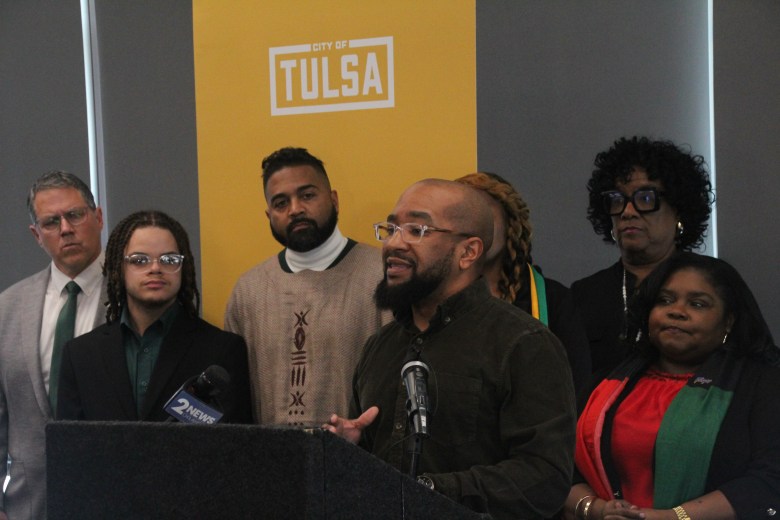|
Listen to this article here
Getting your Trinity Audio player ready...
|
TULSA, Okla. — A century after the destruction of Greenwood, Tulsa’s Beyond Apology Commission is calling for more than just recognition of past wrongs. They are demanding action. The commission has proposed a $24 million housing reparations program to the Office of the Mayor and Tulsa City Council. This marks a crucial step toward repairing the deep generational wounds left by the 1921 Tulsa Race Massacre.
“Repair is not just about acknowledgment, it’s about action,” The Chair of the City of Tulsa’s Beyond Apology Commission, Kristi Williams, said.
A Call for Housing Reparations
If accepted by Mayor Nichols and the Tulsa City Council, it would be the first step toward reparations for the 1921 Tulsa Race Massacre survivors and descendants. Additionally, the program also offers a tier of eligibility for financial housing support to Black North Tulsans.
The city’s website provides the housing reparations program recommendation. It outlines the benefits available to eligible applicants, including financial assistance for purchasing a home or land, home repairs, mortgage payments, property taxes, and more.
The recommendation allocates up to $10,000 for financial readiness, including credit repair and education, to help those preparing to buy a home. Additionally, it designates $2 million for developers planning to build in North Tulsa.

A Place of True Justice and Repair
“We are excited that the city council, that the Office of the Mayor, are willing to take a look at these recommendations,” Commissioner Greg Robinson said. “We are excited to talk about these with community members and ultimately get to the same place that we have all been driving toward, which is a place of true justice and repair.”
Councilwoman Vanessa Hall-Harper read an excerpt of the speech President Ronald Reagan gave after giving Japanese-Americans reparations for putting many of them in internment camps during WWII. Reagan stated in his speech that “It was based solely on race,” before signing bills that provided funding for the communities impacted by American government-led decisions.
The Beyond Apology commission made it clear that it is assisting those impacted by the 1921 Tulsa Race Massacre, a racially motivated attack on the Greenwood District. That is why reparations have an all-Black focus.
“We must acknowledge that America does have a history of righting wrongs of Americans that go beyond just an apology, the sad, sick truth of America is simple, Black lives have not mattered in this country, in this state, nor in this city,” Hall Harper said.
Beyond Apology Commission Prioritizing Survivors and Descendants
The reparations program divides eligibility into four tiers, prioritizing those most impacted by the massacre and its lasting effects:
- Greenwood/North Tulsa Resident (1972-2020) Tier – Later generations who have been impacted by ongoing systemic inequalities
- Survivors Tier – Direct survivors of the 1921 Tulsa Race Massacre
- Descendants, Defenders, and Rebuilders Tier – Children and descendants of massacre survivors
- Greenwood/North Tulsa Resident (1926-1971) Tier – Residents who lived in the historic community
A Deeply Personal Mission
For many Beyond Apology Commission members, this fight is not just political—it is personal. Most are descendants of massacre victims and see this effort as a duty to their ancestors and future generations.
“It is a deeply personal mission to honor our ancestors and secure a future where real, tangible repair takes place,” Williams says. “These housing recommendations reflect that commitment. They establish pathways for home ownership, stabilize housing, and revitalize our neighborhoods.”
Beyond Housing: The Fight Continues
The fight for the eight areas of repair is ongoing. At the next meeting, Councilwoman Vanessa Hall-Harper says they will discuss the next area or multiple areas.
“Justice delayed is justice denied,” Hall-Harper said. “Tulsa is on the precipice of initiating justice for the Greenwood community. Power to the people.”
The other eight communal priorities described in the commission’s report include:
- Education
- Systems Change
- Financial Compensation
- Community & Economic Development
- Housing
- Land
- Health & Wellness
- Cultural Identity
Beyond Apology Commission First Established
Williams described that their primary focus for the first round of recommendations came due to the executive order signed by former Mayor G.T. Bynum.
The Commission, established under Executive Order No. 2024-05, is based on recommendations from reports such as the Beyond Apology Report (2023) and The Case for Reparations (2021).
This proposal is a historic moment for Tulsa—a chance to move beyond acknowledgment and toward meaningful action. The fight for reparations is far from over, but for many in Greenwood, this is a long-overdue first step toward justice.


